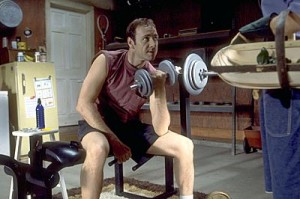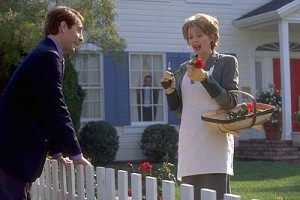 The 1999 Oscar-winning picture, “American Beauty,” could be described as a dark comedy about the American family and the American way of life, displaying dark and unsavory elements of both.
The 1999 Oscar-winning picture, “American Beauty,” could be described as a dark comedy about the American family and the American way of life, displaying dark and unsavory elements of both.
Offering a startlingly incisive view of suburban angst, it was superbly directed by Sam Mendes, with dynamic performances from its entire ensemble, particularly Kevin Spacey in a brilliant Oscar-winning turn.
The low-budget ($15 million) movie was a triumph for DreamWorks, which was disappointed the year before, when Spielberg’s Saving Private Ryan was reduced to also-ran status, when it lost to Miramax’s more aggressively-marketed comedy, Shakespeare in Love. Entertainment Weekly’s Mark Harris depicted American Beauty as “a film that has more laughs than any other in the Best Picture category and is indisputably the grimmest as well.”
 Among other qualities, the film defines its title subject by a plastic garbage bag tossed in the wind, which captures the loveliness of a fleeting moment out of the ordinary.
Among other qualities, the film defines its title subject by a plastic garbage bag tossed in the wind, which captures the loveliness of a fleeting moment out of the ordinary.
First-time scripter Alan Ball, who earlier won a Golden Globe and the Writers Guild prize, mines familiar suburban turf for profound pathos, vibrant characters, and one-liners. Released a year after Happiness, Todd Solondz’s audacious expose of a dysfunctional family, and two years after Ang Lee’s The Ice Storm, American Beauty seemed facile in its satirical elements. Even so, Ball took the concerns of a specific social class and turned them into a redemptive sermon on humanity, exploring the “comforts” of living in an economic boom and the continuing struggle to discover the true meaning of life.
American Beauty has been compared to The Graduate, made thirty years earlier, by the San Jose Mercury News’ critic Julie Hinds. It’s as if Kevin Spacey was playing Benjamin Braddock (the Dustin Hoffman character), now stuck in an unhappy marriage, ready to quit his job at a plastics manufacturer. For Hinds, the movie was a time capsule and a work of art–it depicted what it is like to be alive at a specific time in America and the tendency to ignore the beauty of what’s around you and dream instead of things you can’t have.
Critics, such as Mark Steyn of the London Spectator, disliked the script because it was too much of a compendium of familiar ideas (or cliches). For example, the story is narrated by a corpse, a la Billy Wilder’s “Sunset Boulevard”; the relationship between a mature man lusting after a girl-nymphet recalls Kubrick’s “Lolita,” based on Nabukov’s novel; the use of video camera might have derived from Soderbergh’s 1989 indie, “sex, lies, and videoptape.”
 Talking about the recurrent image of the plastic bag flying in the air, which assumes lyrical qualities, screenwriter Alan Ball explained: “That plastic bag in front of the World Trade Center stands for whatever it is that inspires us to do what we do.”
Talking about the recurrent image of the plastic bag flying in the air, which assumes lyrical qualities, screenwriter Alan Ball explained: “That plastic bag in front of the World Trade Center stands for whatever it is that inspires us to do what we do.”
Though British, Mendes showed instinctive understanding for American character, tone, and dialogue. With the exception of Annette Bening, the rest of the cast is impressive, from Thora Birch as Spacey’s sullen daughter, to Wes Bentley as the mysterious neighbor with hidden depths of wisdom, to Mena Suvari as Spacey’s love interest, a girl who is not as precocious as she acts.
It’s hard to tell whether bening, an otherwise intelligent actress, misperceived the serio-sardonic elements of the comey and decided to interpret her part as a cartoon, encouraging viewers to mock and look down at her, instead of empathizing with or feeling for her plight. Or she might have been misdiredcted by Sam Mendes. Either way, she stands out–for the wrong reasons.
In a year with a multitude of lengthy films, such as Magnolia and The Green Mile, American Beauty was just two-hour long (or 122 minutes, to be exact).
 Dealing with the here and now, American Beauty also had the distinction of being contemporary. In the last twenty years, only five contemporary movies have won Best Picture: Ordinary People, Terms of Endearment, Rain Man, and The Silence of the Lambs.
Dealing with the here and now, American Beauty also had the distinction of being contemporary. In the last twenty years, only five contemporary movies have won Best Picture: Ordinary People, Terms of Endearment, Rain Man, and The Silence of the Lambs.
That said, at Oscar time, the movie received only 8 nominations, the lowest for a Best Picture since Rain Man in 1988.
World-premiering at the Toronto Film Fest, American Beauty was released on September 15, 1999 to great critical acclaim. One of the best-reviewed American films of the year, the picture grossed over $350 million worldwide, of which $130 million were generated domestically and $220 million internationally.
Oscar Alert
It was the fourth time in the past five years that the Best Picture was based on an original script–good news for the speculation script market.
Oscar Nominations: 8
Picture, produced by Bruce Cohen and Dan Jinks
Director: Sam Mendes
Screenplay (Original): Alan Ball
Actor: Kevin Spacey
Actress: Annette Bening
Cinematography: Conrad l. Hall
Original Score: Thomas Newman
Editing: Tariq Anwar and Christopher Greenbury
Oscar Awards: 4
Picture
Director
Screenplay
Actor




Speak Your Mind